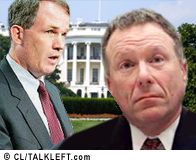As part of its proof on this issue, the government seeks to introduce in evidence at trial five non-disclosure agreements executed by defendant during the course of his employment as the Vice President’s Chief of Staff and National Security Advisor, and as the President’s National Security Advisor. See GX5A-GX5F, copies of which have been provided to the Court and defense counsel.
These agreements are signed instruments having independent legal significance, and thus are nonhearsay, and also are admissible as admissions of a party-opponent. Because these agreements are
probative of defendant’s state of mind at the time of the charged offenses, they should be admitted.
This is a defensive motion on Fitz' part. He's reacting to Wells' claim in opening statements that Libby had no motive to lie. Previously, Fitz had alleged Libby's motive was not to lose his job. But Wells claimed Libby was not concerned with losing his job. Fitz thinks these agreements constitute new proof.
Fitz argues:
The nondisclosure agreements executed by defendant tend to establish that defendant undoubtedly fully understood the serious obligations imposed by the nondisclosure agreements – and the severe potential consequences of violating them. Given other evidence that will establish that defendant was also aware at the time he made the charged false statements that Ms. Wilson’s employment may have been classified, and that the FBI and grand jury were investigating possible crimes arising from the disclosure of Ms. Wilson’s CIA employment to reporters, the nondisclosure agreements are directly relevant to the issue of whether defendant lied intentionally about his role in receiving and disseminating information concerning Ms. Wilson’s employment. Thus, the agreements should be admitted.
Fitz says Libby's state of mind is the most important issue in the case, especially given that Libby "disclosed to reporter Judith Miller" and "confirmed to reporter Matthew Cooper" that Valerie Wilson worked for the CIA.
Fitz still isn't alleging that Libby disclosed classified information about Plame.
Consistent with the position the government has taken prior to, and during trial, the government has no objection to a limiting instruction stating that the nondisclosure agreements are to be considered only with respect to defendant’s state of mind, and not as an allegation that the defendant in fact disclosed classified information in violation of the agreements.
I'm not sold on this motion. There's no linkage to Libby's focus on the agreements at the time he was interviewed by the FBI or testified to the grand jury. I could see it if Fitz had evidence of a conversation Libby had with someone about his fear that his comments to reporters violated the non-disclosure agreements. But, those agreements are standard for people in sensitive government positions. Had he re-read them or been reminded of them before his interviews with FBI agents or grand jury testimony?
Without evidence that Libby was concerned about the non-disclosure agreements at the time of his statements, I don't think the mere existence of them establishes motive.
I'm sure Team Libby will file a response in opposition. From the defense perspective, what other arguments do you see in opposition?




